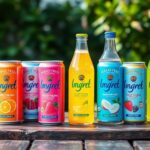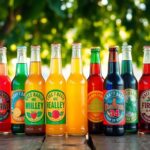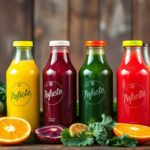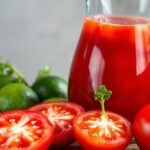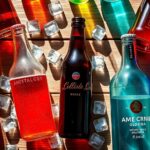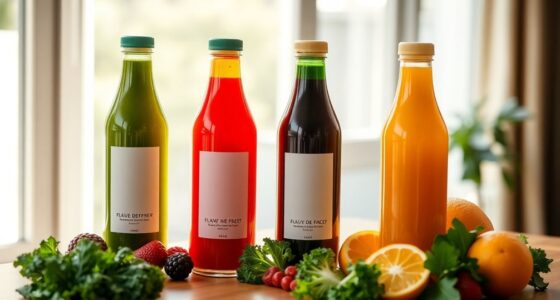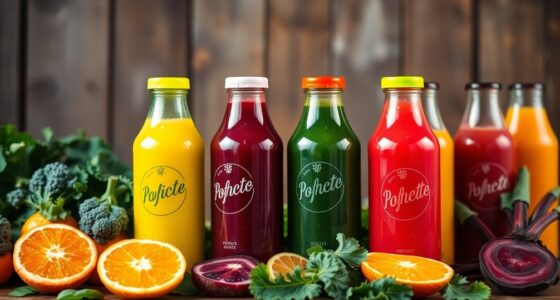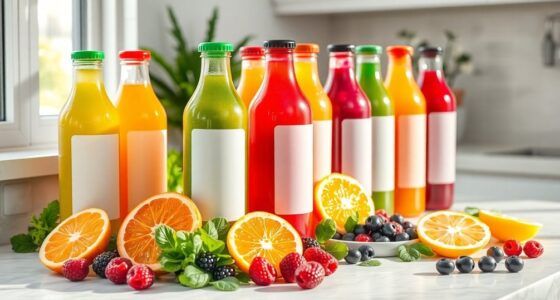Coca-Cola leads the way with its iconic taste and massive market share. Pepsi closely follows with a diverse lineup that includes classics and hydration options. Dr Pepper offers a unique blend of flavors, making it a favorite among many. Sprite refreshes with its crisp lemon-lime taste, while Mountain Dew caters to adventurous souls seeking bold flavors. Gatorade dominates the sports drink sector, fueling athletes everywhere. Want to discover more about these elite brands?
Key Takeaways
- Coca-Cola leads with a 44.9% market share in the U.S. carbonated soft drink sector and enjoys global daily servings of 1.9 billion.
- Pepsi ranks as the No. 2 brand, offering a diverse range of products and generating over $91 billion in net revenue annually.
- Dr Pepper, known for its unique 23 flavors, holds approximately 8.3% of the U.S. soda market and maintains a loyal fan base.
- Sprite, with an 8.1% market share, is a popular lemon-lime beverage recognized for its crisp taste and health-conscious options.
- Gatorade dominates the U.S. sports drink market with a 65% to 67% share, innovating with products like Gatorade Zero for active consumers.
Coca-Cola: The Iconic Soft Drink Leader
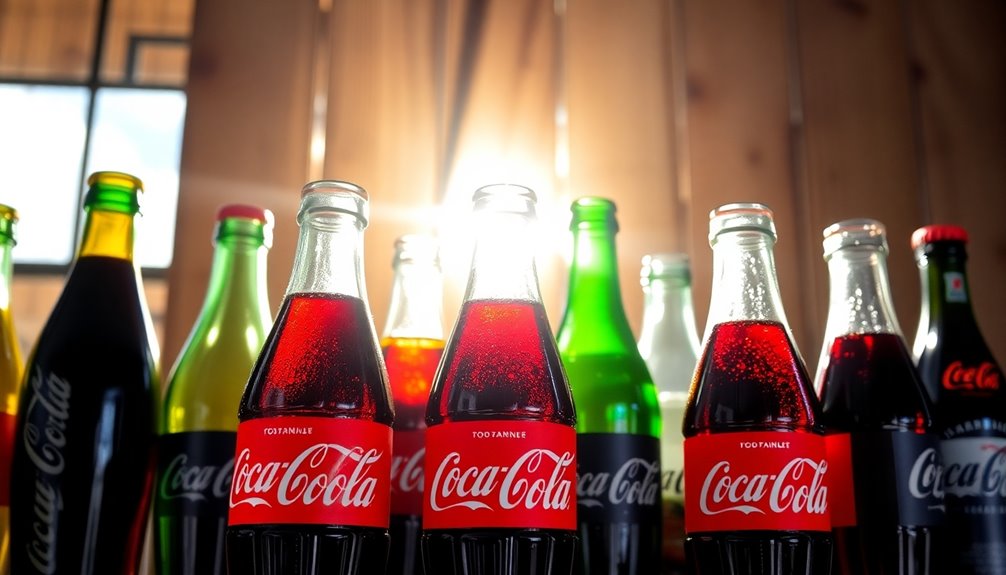
Coca-Cola has long been the iconic leader in the soft drink industry, captivating taste buds since its creation in 1886 by John Stith Pemberton. Initially, only 25 bottles were sold in the first year, but that modest beginning paved the way for enormous success. By 2023, Coca-Cola achieved an impressive annual sales volume of 33.3 billion cases, dominating 44.9% of the U.S. carbonated soft drink market. With daily servings reaching 1.9 billion worldwide, the brand is recognized by 95% of internet users in the U.S. Furthermore, the company boasts an extensive portfolio, including beloved drinks like Sprite, Fanta, and Powerade. Coca-Cola's global presence spans over 200 countries, solidifying its status as one of the most valuable brands. Coca-Cola's market share has consistently remained between 17-20% since 1995, showcasing its enduring dominance in the industry.
Pepsi: the Challenger With a Diverse Portfolio
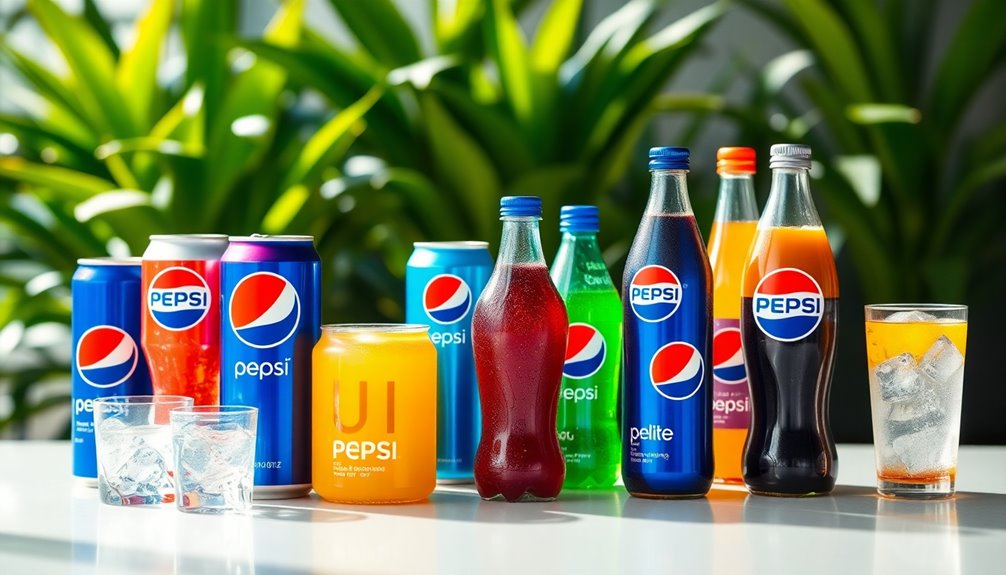
While Coca-Cola may be the leader in the soft drink market, Pepsi has established itself as a formidable challenger with a diverse portfolio that appeals to a wide range of consumers.
You can enjoy classic Pepsi alongside variations like Pepsi Zero Sugar and Wild Cherry. For a citrus kick, Mountain Dew offers options like Diet Mountain Dew and Code Red.
If you're into sports, Gatorade delivers various flavors tailored for hydration. PepsiCo even covers bottled water with Aquafina and fresh juices through Tropicana. Recently, Subway announced a 10-year agreement with PepsiCo to enhance its beverage offerings. Additionally, PepsiCo's commitment to diversification strategies ensures its resilience in a competitive market.
With over $91 billion in net revenue and products enjoyed globally over a billion times daily, Pepsi's innovative approach and strategic partnerships ensure it remains a key player in the beverage industry.
Dr Pepper: The Unique Flavor Sensation
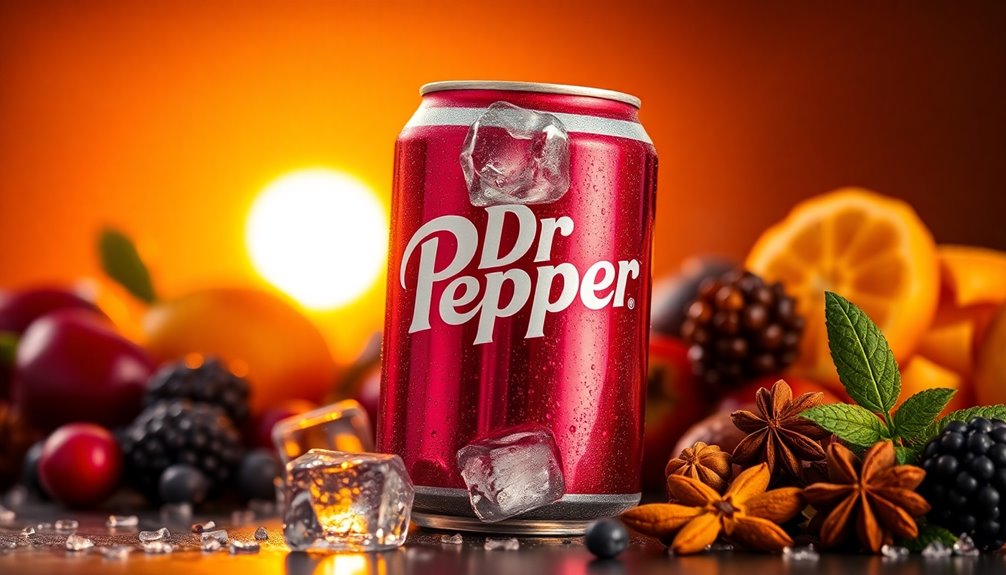
As Pepsi continues to challenge the beverage landscape with its diverse offerings, another iconic brand stands out for its distinct character: Dr Pepper.
First served in 1885 in Waco, Texas, Dr Pepper is the oldest soft drink in the U.S. Its unique blend of 23 flavors—including cola, cherry, and warm spices—creates a taste that's both refreshing and complex. Dr Pepper predates the invention of Coca-Cola, highlighting its long-standing presence in the soft drink market.
Initially popular in the American South, it gained national recognition in the 1970s as a standout alternative to traditional sodas.
Today, Dr Pepper holds about 8.3% of the U.S. soda market, tying with Pepsi as the No. 2 brand. Its polarizing flavor profile and innovative marketing keep loyal fans intrigued, ensuring its place in the competitive beverage landscape.
Sprite: The Refreshing Lemon-Lime Favorite
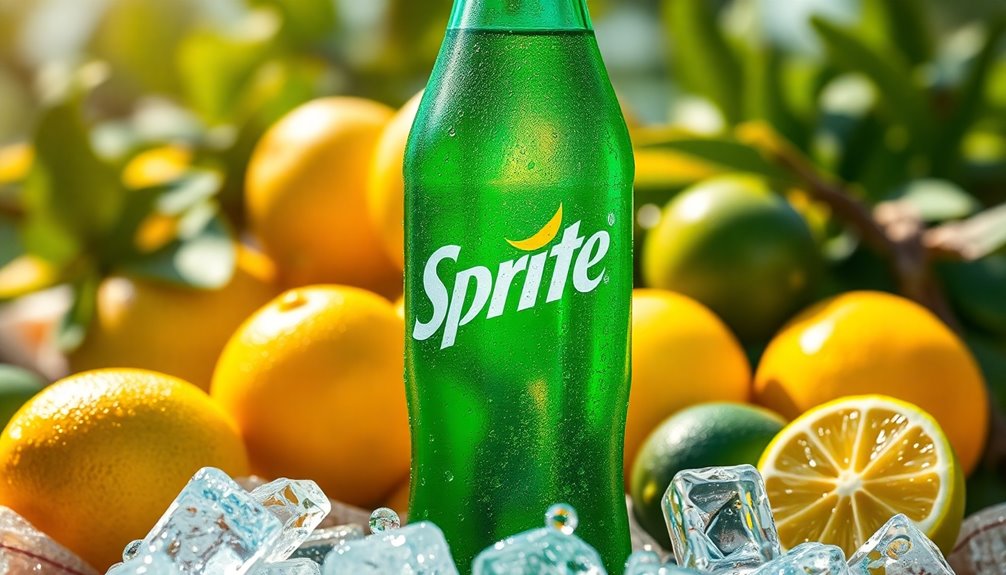
If you're looking for a crisp and refreshing beverage, Sprite is a go-to choice for many. With a remarkable 94% brand awareness among U.S. soft drink drinkers, it's no surprise that 51% of them enjoy this lemon-lime favorite. Sprite boasts an impressive 8.1% market share, competing fiercely with giants like Coke and Pepsi. Its popularity is evident, as 47% of soft drink drinkers use Sprite regularly, with a strong 83% loyalty rate among its users. Additionally, 54% of those aware of Sprite express liking for the brand, further showcasing its appeal. The brand's refreshing flavor and innovative marketing, including collaborations with stars like LeBron James, keep consumers engaged. As part of The Coca-Cola Company's portfolio, Sprite continues to thrive, ensuring its place among America's top-selling beverages. Moreover, it aligns with the trend of no-sugar-added brands that prioritize health-conscious consumers.
Mountain Dew: The Bold Choice for Adventurers
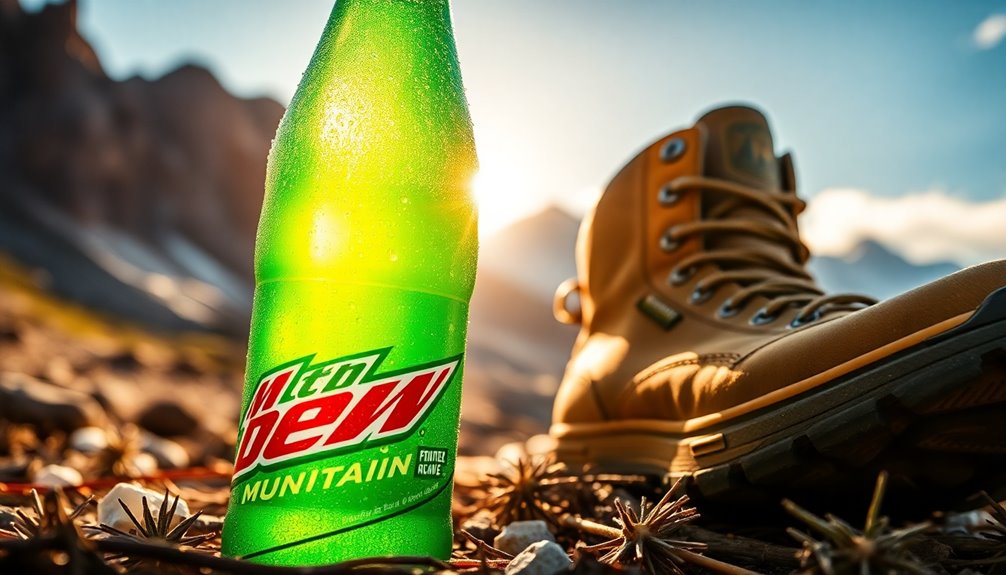
For those who crave adventure and excitement, Mountain Dew stands out as a bold choice among soft drinks.
With a market share of around 6.6% in the U.S., it captures attention and loyalty, boasting a 93% brand awareness. About 43% of consumers express a liking for it, and 40% actively choose Mountain Dew.
Its vibrant marketing strategy aligns perfectly with extreme sports and gaming, appealing to a youthful audience. Plus, it dominates digital food delivery, achieving a 29.5% penetration rate in the U.S.
This strong presence, coupled with a significant advertising investment of $48 million in 2021, solidifies Mountain Dew's status as the go-to beverage for those seeking thrills and bold flavors.
Gatorade: The Champion of Sports Drinks
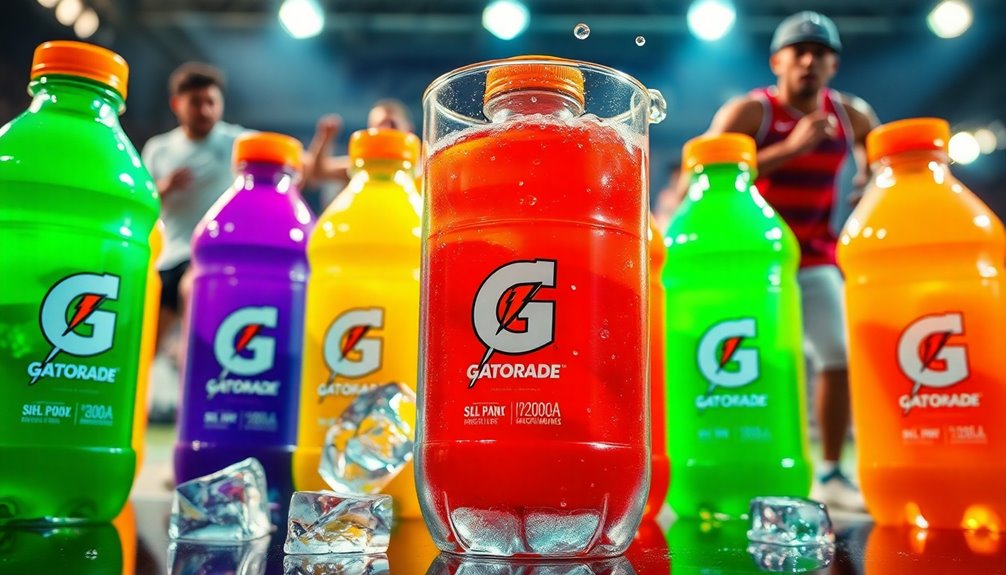
With a commanding market share of 65% to 67% in the U.S. sports drink sector, Gatorade has established itself as the go-to choice for athletes and active individuals alike. In 2021 alone, Gatorade's sales exceeded six billion dollars, far outpacing competitors like Powerade. To maintain its edge, Gatorade innovated with products like Gatorade Zero and the G Series, catering to various hydration needs. Their smart cap technology offers hydration feedback, enhancing your experience. Targeting athletic males and leveraging celebrity endorsements, Gatorade stays relevant through effective marketing. Despite emerging competitors and health concerns over sugar content, Gatorade's commitment to personalized solutions and natural options keeps it at the forefront of the expanding sports drink market. Notably, the total U.S. dollar sales of sports drinks amounted to 10.1 billion USD in 2021, underscoring Gatorade's significant impact on the industry.
Frequently Asked Questions
What Ingredients Are Commonly Used in These Beverages?
When you look at popular beverages, you'll find common ingredients like high fructose corn syrup for sweetness, carbonated water for fizz, and caffeine for a boost.
Many soft drinks include natural flavors to enhance taste, while sports drinks often have electrolytes to replenish lost salts.
Juices might use concentrated fruit juice for flavor, and coffee beverages typically contain caffeine.
Preservatives are also common, helping to maintain freshness and extend shelf life.
How Do These Brands Market to Different Demographics?
These brands market to different demographics by tailoring their advertising strategies.
You'll notice Coca-Cola uses diverse campaigns for various age groups, while Pepsi targets younger audiences with music partnerships.
Dr Pepper taps into nostalgia for older consumers, and Sprite connects with youth through sports sponsorships.
Welch's focuses on family-oriented messaging.
Each brand employs social media, sponsorships, and product diversification to engage their specific target audiences effectively, ensuring they resonate with their consumers.
What Are the Environmental Impacts of These Beverage Companies?
The environmental impacts of beverage companies are significant.
You'll notice that Coca-Cola strives to reduce its carbon footprint, but faces challenges due to scale.
PepsiCo sets ambitious sustainability goals, focusing on water efficiency.
Dr Pepper emphasizes packaging waste reduction.
Sprite benefits from Coca-Cola's initiatives, while Minute Maid aligns with its parent company's efforts.
How Do Beverage Brands Respond to Health Trends?
Beverage brands respond to health trends by creating products that cater to your desire for healthier options. These brands are increasingly focusing on natural ingredients, low-calorie alternatives, and functional beverages that promote wellness. As consumers become more health-conscious, top tasting beverage brands are innovating to offer refreshing drinks that not only taste great but also provide added health benefits. This shift not only meets the demand for healthier choices but also encourages a lifestyle that prioritizes overall well-being.
They focus on natural ingredients, low-sugar alternatives, and functional drinks that offer additional health benefits.
Brands also emphasize sustainability and transparency, appealing to your environmentally conscious side.
Through targeted marketing and consumer education, they highlight the health advantages of their products, ensuring you stay informed and engaged with their latest innovations.
What Role Do Social Media Play in Brand Engagement?
You might think social media is just a trend, but it's vital for brand engagement.
It's where you connect with brands and influence purchasing decisions. When brands share relatable content or respond quickly, you feel more valued and loyal.
Engaging with communities and real people behind brands enhances that connection. Plus, brands that listen to your feedback create relevant content, making you more likely to become a repeat customer.
Social media's impact is undeniable!
Conclusion
In the grand tapestry of American beverages, each brand weaves its own tale, echoing the dreams and desires of those who sip from their bottles. Just like a loyal friend, Coca-Cola refreshes your spirit, while Pepsi challenges you to explore new horizons. Dr Pepper tantalizes your taste buds, and Sprite revitalizes your soul. Mountain Dew dares you to embrace adventure, and Gatorade fuels your triumph. Together, they remind us that every sip is a celebration of life's flavors.
Susannah expertise lies in researching and compiling evidence-based content on juicing, nutrition, and overall health. She is committed to ensuring that The Juicery World offers accurate, up-to-date, and trustworthy information to empower readers to take control of their health. Susannah’s goal is to inspire individuals to embrace juicing as a way to nourish their bodies and live their best lives.




